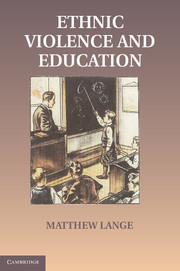Book contents
- Frontmatter
- Contents
- Figures
- Tables
- Acknowledgments
- 1 Introduction
- 2 Education and Ethnic Violence
- 3 Testing the Impact of Education on Ethnic Violence
- 4 Education and Ethnic Violence in Sri Lanka
- 5 Education and Ethnic Violence in Cyprus
- 6 Education and Ethnic Violence in the Palestinian Territories, India, and Sub-Saharan Africa
- 7 Education and Ethno-Nationalist Conflict in Canada and Germany
- 8 Education and Ethnic Violence
- Bibliography
- Index
3 - Testing the Impact of Education on Ethnic Violence
A Cross-Sectional Time-Series Analysis
Published online by Cambridge University Press: 05 June 2012
- Frontmatter
- Contents
- Figures
- Tables
- Acknowledgments
- 1 Introduction
- 2 Education and Ethnic Violence
- 3 Testing the Impact of Education on Ethnic Violence
- 4 Education and Ethnic Violence in Sri Lanka
- 5 Education and Ethnic Violence in Cyprus
- 6 Education and Ethnic Violence in the Palestinian Territories, India, and Sub-Saharan Africa
- 7 Education and Ethno-Nationalist Conflict in Canada and Germany
- 8 Education and Ethnic Violence
- Bibliography
- Index
Summary
Statistical methods explore generalizable causal arguments and are based on the assumption that A should be related to B if there is a causal relationship between A and B. Thus, if heavy rain triggers mudslides, mudslides should be more common during or shortly after heavy rain, and this can be tested statistically. One should not expect a perfect one-to-one relationship, however, as mudslides also depend on hilly terrain, deforestation, earth quakes, volcanic eruptions, and other factors. Along these lines, if education is a common determinant of peaceful ethnic relations, one would expect that educational attainment is usually lower among populations that experience ethnic violence and higher in regions with peaceful intercommunal relations. Alternatively, if education promotes ethnic violence, places with higher levels of education should – on average – experience higher levels of ethnic violence. Although there are many analyses that use statistics to provide insight into the causes of ethnic violence, very few actually explore whether education is related to it (see Lange and Balian 2008; Lange and Dawson 2010). The present chapter does just this. Based on the theoretical framework presented in Chapter 2, it also explores whether the impact of education on ethnic violence depends on ethnic diversity, the availability of resources, and the effectiveness of political institutions.
Data and methods
To explore the relationship between education and ethnic violence, I perform a cross-sectional time-series analysis. This methodology combines and simultaneously exploits two different types of statistical comparison to investigate the correlates of ethnic violence. First, it compares different countries to explore whether particular country-level characteristics are related to ethnic violence. Thus, if countries that experienced ethnic violence, on average, had populations with higher levels of education than countries that did not, it provides evidence that education contributes to ethnic violence. Second, the time-series element takes into consideration whether educational changes within a particular country over time are related to changes in ethnic violence within that same country over time. Thus, if ethnic violence is more common after periods of rapid educational expansion, this also provides evidence that education promotes ethnic violence.
- Type
- Chapter
- Information
- Educations in Ethnic ViolenceIdentity, Educational Bubbles, and Resource Mobilization, pp. 35 - 58Publisher: Cambridge University PressPrint publication year: 2011



